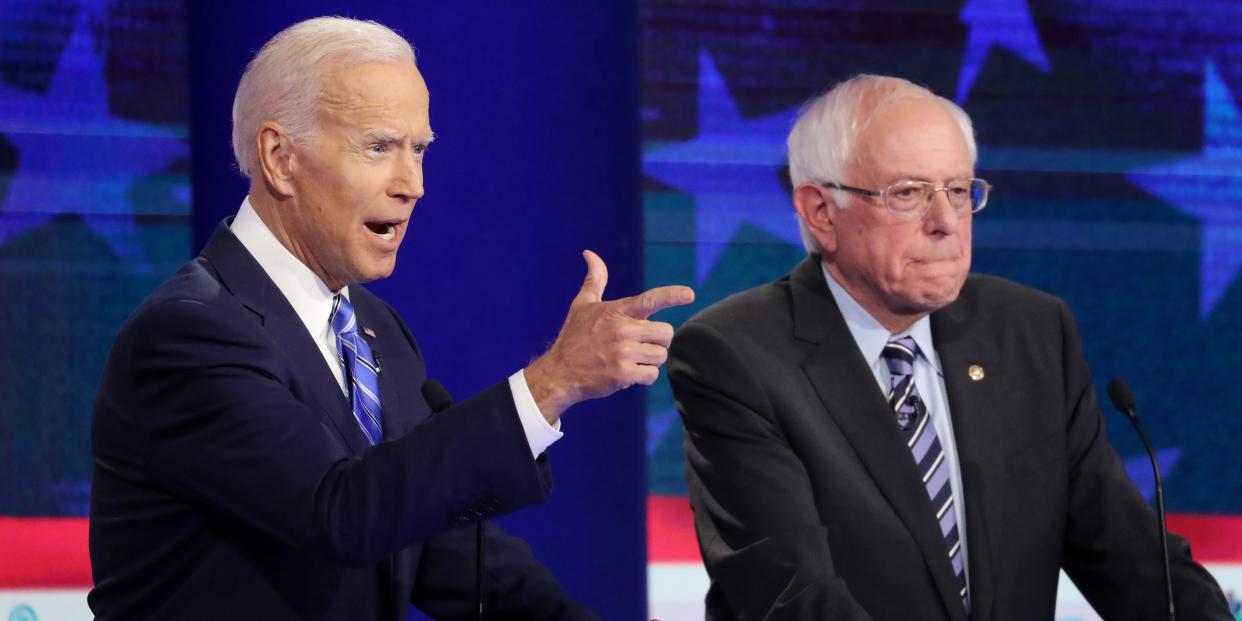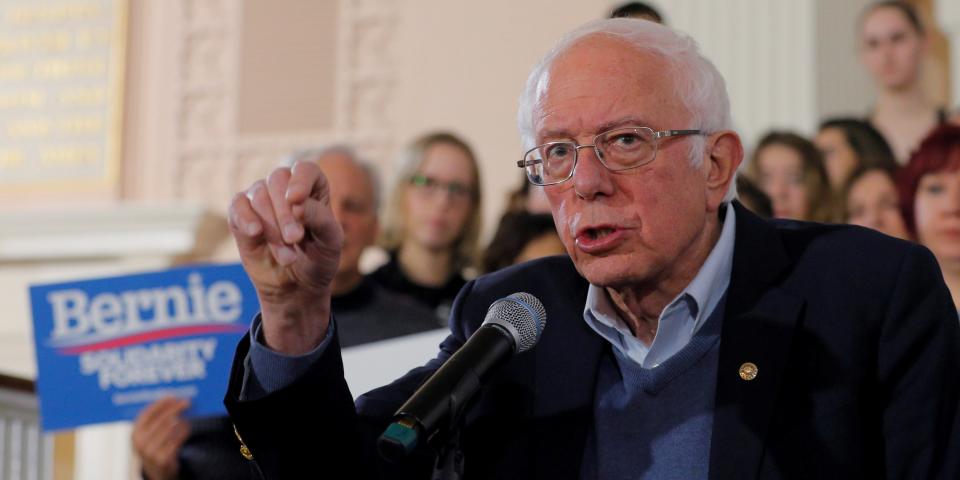Joe Biden is underwater with voters earning less than $75,000 a year, who overwhelmingly prefer Bernie Sanders

Drew Angerer/Getty Images
Recent Insider polling indicates that former Vice President Joe Biden's net satisfaction is underwater with voters earning less than $75,000 a year, who prefer Sen. Bernie Sanders.
Over the past 10 polls conducted from early September to early December, we broke down each candidate's satisfaction by categories including race, gender, education, and income.
The former vice president has very high satisfaction, however, among voters reporting incomes of $75,000 and above.
Sanders' net satisfaction by income level breaks down the opposite way of Biden's. It's highest among voters with the lowest annual incomes but is negative among voters earning $100,000 or more a year.
Recent Insider polling indicates that former Vice President Joe Biden underperforms with middle-class voters earning less than $75,000 a year compared with his overall performance in contrast with Sen. Bernie Sanders, who performs better among those voters relative to his overall standing.
To help make sense of where all the 2020 candidates stand, Insider has been conducting a recurring SurveyMonkey Audience national poll for almost a year.
You can download every poll here, down to the individual respondent data, and see the sample size and margin of error for all six of the polls we cite here. (Read more about how the Insider 2020 Democratic primary tracker works.)
Instead of asking respondents who they would vote for if their primary election were held tomorrow, we ask respondents which candidates they would be broadly satisfied with as the Democratic nominee.
Over the past 10 polls, conducted from early September to early December, we broke down each candidate's satisfaction by categories including race, gender, education, and income to get a look at the candidates' satisfaction by demographic group. To note an important caveat, we broke down the results by yearly income and not total net worth, a very different metric.
Overall, 54% of people in our set were satisfied with Biden as the nominee. But when you look closer, Biden's doing worse among the very middle-class voters he aims to woo. Here's how Biden's net satisfaction breaks down by income level:
Biden is satisfactory as the nominee to 48% of Democratic primary voters reporting an annual income of $10,000 or less, which is 6.5 percentage points lower than his performance overall.
47% among voters with an income of $10,000 to $25,000 (-7.8 percentage points)
49% among voters with an income of $25,000 to $50,000 (-5.2 percentage points)
53% among voters with an annual income to $50,000 to $75,000 (-1.3 percentage points)
The former vice president has very high net satisfaction, however, among voters reporting incomes of $75,000 and above.
Biden has half-jokingly touted himself as "Middle-Class Joe" for decades, and drawn on his working-class roots both to connect with voters and successfully court the support of labor unions and trade organizations throughout his career.
"If I heard one more thing about the scrappy kid from Scranton, Pennsylvania, and carrying a lunch bucket — I never carried a lunch bucket, but I guess I'm the middle-class guy. By the way, I'm proud of that. I'm proud of that," Biden said at a 2009 event, according to The Washington Post.
But with an estimated net worth of $9 million, according to Forbes, Biden isn't so middle class anymore.
The Bidens earned $11 million immediately after leaving the White House in 2017 and another $4.5 million in 2018, mainly from book royalties and speaking engagements, according to tax returns and financial disclosures released by the Biden campaign earlier this summer.

Reuters
Sanders performs much better among voters earning $75K or less
People with annual incomes below $75,000 expressed the highest satisfaction with Sanders out of the major candidates recently surveyed by Insider. This could be explained in part by the fact that Sanders performs extremely well among younger voters, who tend to earn less than older ones.
Sanders' satisfaction by income level breaks down the opposite way of Biden's. It's highest among voters with the lowest range of annual incomes but is lower compared with his overall performance among voters earning $100,000 or more a year.
Sanders is satisfactory to the nominee among 62% of those with annual incomes of $10,000 or less, 7.7 percentage points higher than his performance overall.
63% among voters with an income of $10,000 to $25,000 (+8.7 percentage points)
56% among voters with an income of $25,000 to $50,000 (+1.8 percentage points)
55% among voters with an income of $50,000 to $75,000 (+1 percentage point)
Sanders has gained a loyal following of supporters around the country by embracing democratic socialism and attempting to check the power of millionaire and billionaire corporate executives.
The Vermont senator, who came from a working-class background, has framed his campaign largely as a fight for the least powerful Americans. Today, Sanders and his wife, Jane, are estimated to have a net worth of about $2 million.
He supports "Medicare for All," increasing the minimum wage and bolstering labor protections, making public college free, and massively expanding other social programs.
Both Sanders and fellow progressive Sen. Elizabeth Warren have proposed levying wealth taxes specifically targeting the richest Americans to expand the United States' welfare state.
Biden, on the other hand, does not support "Medicare for All" or free public college, proposing notable but far less expansive programs to benefit working-class Americans such as bolstering the Affordable Care Act and investing $750 billion in higher education, which he says will be paid for with higher corporate taxes.
Read more:
Joe Biden denies reports that he's considering serving only one term as president because of his age
Read the original article on Business Insider

